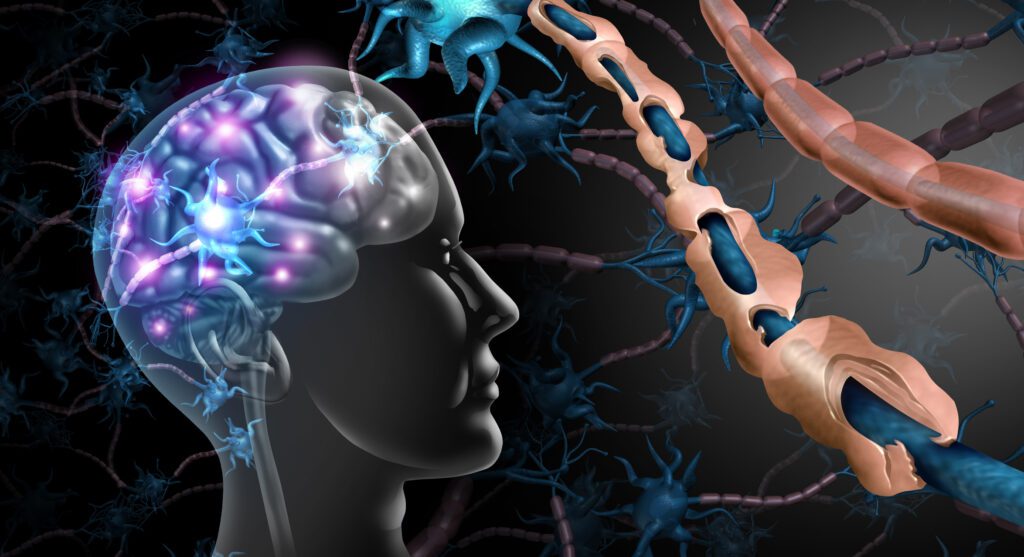A New Paradigm in MS Rehabilitation
Multiple Sclerosis (MS) is a complex, chronic neurodegenerative condition that disrupts the body’s central nervous system (CNS), leading to inflammation, demyelination, and irreversible neuronal damage. Common symptoms include fatigue, muscle weakness, sensory disturbances, spasticity, vision problems, and cognitive decline often fluctuating in unpredictable cycles. According to the Atlas of MS (2020), over 2.8 million people globally, including nearly 200,000 individuals in India, are living with this disabling disease—most of them women between the ages of 20 and 40. Traditionally, MS has been viewed and treated primarily as an autoimmune disorder. However, emerging evidence reveals a deeper root-cause web involving gut dysbiosis, mitochondrial dysfunction, chronic infections, environmental toxins, neuroinflammation, and nutritional deficits. These factors often remain unaddressed by conventional treatments, which focus mainly on immunosuppression and relapse management. At Recoup Health, we offer a pioneering, integrative root cause rehabilitation approach that goes beyond symptom suppression. Our 4R Protocol – Relief, Root Cause Redressal, Restoration, and Regeneration blends functional medicine, advanced neurorehabilitation, regenerative therapies, and lifestyle optimization to target the disease at its biological and systemic roots. This holistic, evidence-based program supports not just stabilization, but potential reversal of functional decline, and long-term resilience against relapse.
Real-World Case Insight: From Fatigue and Disability to Function and Fulfillment
A 33-year-old woman presented with a 5-year history of relapsing-remitting MS (RRMS). She had experienced three confirmed relapses with partial remissions. Her primary complaints at the time of evaluation included:
- Severe fatigue (Modified Fatigue Impact Scale score: 56/84)
- Gait imbalance with frequent falls
- Bilateral lower limb spasticity (Modified Ashworth Scale: 2)
- Cognitive dysfunction: word-finding difficulty, brain fog
- Bladder urgency and hesitancy
- Sleep disturbances and high anxiety
- Persistent constipation
MRI revealed multiple demyelinating plaques in the periventricular and cervical regions. She was on interferon beta-1a, but had not responded well, and had begun seeking Rehabilitation and integrative strategies. Comprehensive functional testing revealed significant gut dysbiosis and elevated zonulin levels, indicating increased intestinal permeability and compromised gut barrier function. The toxin profile showed high levels of bisphenol A (BPA) and mercury, both known contributors to neuroinflammation and immune dysregulation. Micronutrient analysis identified deficiencies in vitamin B12, vitamin D3, and magnesium, all of which play critical roles in neurological health, myelination, and mitochondrial function. Mitochondrial assessment revealed reduced CoQ10 and elevated markers of oxidative stress, consistent with impaired cellular energy metabolism. A flattened cortisol rhythm suggested adrenal dysregulation, often associated with chronic stress and autonomic imbalance. Additionally, continuous glucose monitoring (CGM) indicated postprandial dysglycemia, pointing to metabolic inflexibility and poor glycemic control, which can exacerbate neuroinflammatory pathways in Multiple Sclerosis.
The 4R Framework: Recoup’s Core Protocol for MS Rehabilitation
Phase 1: Relief of Symptoms
The phase 1 of Recoup’s 4R Protocol integrates a comprehensive set of advanced physical, neurological, and psychological therapies designed to alleviate key symptoms of Multiple Sclerosis (MS), including fatigue, gait instability, spasticity, neuropathic pain, bladder dysfunction, and cognitive decline. These interventions are clinically validated, non-invasive, and tailored to support neuroplasticity, independence, and overall quality of life.
1. Neuro-Education- Patient education on MS pathophysiology, neuroplasticity, and self-care strategies to foster empowerment and engagement.
2. Physical Therapy- Spasticity management, proprioceptive neuromuscular facilitation (PNF), balance and gait retraining, fall prevention, coordination, and posture control.
3. Aquatic Therapy- Buoyancy-assisted movement for muscle relaxation, pain control, and gait improvement in a low-impact environment.
4. Whole Body Vibration Therapy- Facilitates muscle activation, enhances proprioception, and supports balance recovery.
5. Body Weight Supported Treadmill Training (BWSTT)- Enables safe gait retraining and balance enhancement by reducing load during walking.
6. Hippotherapy (Horse Simulator)- Improves balance, trunk control, and vestibular integration through simulated equine movement.
7. Tai Chi and Yoga- Mindful movement practices that improve proprioception, breathing, balance, flexibility, and emotional calm.
8. Franklin Method- Uses dynamic imagery and somatic education to retrain movement patterns and neuromuscular coordination.
9. Occupational Therapy (OT)- Training in grooming, dressing, and feeding; includes energy conservation, fine motor skills, and adaptive equipment use for independence.
10. Exergaming with Smart Playball- Gamified therapy that improves balance, upper limb coordination, attention, and visuospatial skills, while boosting engagement.
11. Sleep Optimization- Combines nutraceuticals, behavioral coaching, iCBT for insomnia (iCBT-i), and iACT to restore circadian rhythm and improve restorative sleep.
12. Colon Hydrotherapy- Supports gut detoxification and regular bowel movements, crucial for gut-brain axis regulation in MS.
13. Anti-Inflammatory Nutrition (Wahls Protocol – Level 1)- Nutrient-dense, inflammation-lowering dietary approach to support mitochondrial and neurological health.
14. Psychological First Aid- Cognitive Behaviour Therapy for adjustment issues, Pain Reprocessing Therapy for chronic pain, and coaching for emotional resilience and stress regulation.
Phase 2: Root Cause Redressal
The second phase of the Recoup 4R Program focuses on identifying and addressing biochemical, immunological, microbial, and environmental triggers that contribute to MS progression. These upstream contributors are evaluated and treated through personalized, evidence-based interventions aimed at systemic detoxification, gut restoration, mitochondrial support, and immune modulation.
1. Comprehensive Functional Testing- Advanced lab assessments targeting gut health, immune dysfunction, toxic load, and micronutrient imbalances to identify root-level contributors to neuroinflammation and demyelination.
2. Colon Hydrotherapy- Supports elimination of toxins, improves bowel regulation, and restores gut integrity—essential for managing leaky gut and gut-brain axis dysfunction.
3. Red Light Therapy (Far and Near Infrared)- Enhances mitochondrial energy production, reduces oxidative stress, and supports tissue repair through photobiomodulation.
4. Cold and Heat Exposure (Contrast Hydrotherapy)- Includes infrared sauna sessions and cold showers to promote lymphatic drainage, detoxification, immune balance, and hormetic stress adaptation.
5. Breathwork and Vagal Nerve Stimulation- Incorporates diaphragmatic breathing, humming, cold exposure, and other techniques to enhance parasympathetic tone and autonomic regulation.
6. Exercise Therapy with HRV Biofeedback- Structured movement sessions paired with real-time heart rate variability monitoring to optimize stress recovery, resilience, and autonomic nervous system balance.
7. Wahls Paleo Plus Diet- A ketogenic, anti-inflammatory, nutrient-dense protocol rich in leafy greens, organ meats, and healthy fats to support mitochondrial health, detox, and immune modulation.
8. Mitochondrial Enhancement (IV Nutrition)- Intravenous administration of glutathione, B-vitamins, magnesium, amino acids, and antioxidants to improve energy metabolism and cellular resilience.
9. Mind-Body Therapies
- EMDR (Eye Movement Desensitization and Reprocessing) for trauma resolution
- DBT (Dialectical Behavior Therapy) for emotional regulation
- EFT (Emotional Freedom Technique) for stress and anxiety modulation
10. Guided Imagery- Cognitive visualization practices to reduce stress reactivity, support immune balance, and activate the brain’s healing networks.
11. Ayurveda: Panchakarma Detoxification- Traditional Ayurvedic protocols for deep detoxification, digestive reset, and immune rejuvenation, customized to the individual’s constitution and toxic load.
Phase 3: Restoration of Physiological Balance
The third phase of Recoup’s 4R Program focuses on reintegrating biological systems, enhancing neurological resilience, and improving cognitive and motor performance. This stage emphasizes advanced neurorehabilitation, metabolic optimization, ergonomic support, and psychological empowerment to restore function and quality of life.
1. Advanced Neurorehabilitation- Targeted interventions to enhance brain-body coordination and neuroplasticity, including:
- Coordination Dynamics Therapy (CDT)
- Virtual and Augmented Reality-Based Rehabilitation
- Functional Electrical Stimulation (FES)
- Neurofeedback for cognitive and emotional balance
- HRV-based breath retraining for autonomic regulation
2. Alexander Technique and Feldenkrais Method- Hands-on sensorimotor retraining techniques to improve body awareness, postural alignment, and movement efficiency in MS patients.
3. CGM-Guided Metabolic Optimization- Continuous Glucose Monitoring (CGM)-based interventions to assess and improve insulin sensitivity, glycemic variability, and support neuroenergetic stability.
4. IV Micronutrient Therapy- Targeted intravenous infusions including glutathione, Vitamin C, B-vitamins, magnesium, and amino acids to support cellular repair, oxidative balance, and neuroprotection.
5. Treatment of Toxins and Chronic Infections- Where indicated, patients undergo detoxification protocols such as chelation therapy, antimicrobial support, or antifungal therapy to address underlying biological burdens.
6. Occupational Therapy and Ergonomic Support- Comprehensive support for home and work functionality, including:
- Handrails, voice-activated lighting, assistive devices
- Fall prevention strategies and home modifications
- Workstation ergonomics assessments and adaptive equipment planning
7. Hormone Profile Review and HRT- Evaluation and optimization of hormonal imbalances contributing to fatigue, mood changes, and metabolic dysfunction, with bioidentical hormone replacement therapy (HRT) when necessary.
8. Psychological Empowerment Therapies- Focused on enhancing resilience, self-worth, and emotional wellbeing through:
- Purpose Therapy
- Positive Psychology Journaling
- Group resilience training programs
9. Positive Neuroplasticity Training (PNT)- A structured neuropsychological program that helps individuals with MS build and reinforce new neural pathways related to gratitude, optimism, and inner strength. Techniques help the brain “take in the good” to enhance emotional stability and cognitive recovery.
Phase 4: Regeneration and Longevity
The final phase of Recoup’s 4R Protocol focuses on neuroregeneration, immune optimization, and biological age reversal to sustain long-term function and reduce the risk of disease progression or relapse. This stage blends cutting-edge regenerative therapies, precision medicine, and preventive strategies to future-proof neurological health.
1. Hyperbaric Oxygen Therapy (HBOT)- Enhances oxygen delivery, stimulates neurogenesis and stem cell activation, and supports remyelination in regions affected by MS-related demyelination.
2. Ozone Therapy and Molecular Hydrogen- Used to modulate the immune response, reduce oxidative stress, and support detoxification pathways. These therapies help regulate chronic inflammation and improve redox balance.
3. IV Nutrition- High-potency intravenous infusions of antioxidants, vitamins, amino acids, and mitochondrial cofactors to restore cellular energy, immune resilience, and tissue repair mechanisms.
4. Peptide Therapies- Experimental use of immunomodulatory peptides that target myelin-reactive T cells to:
- Reduce CNS inflammation
- Promote bystander immune suppression
- Enhance remyelination and tissue repair
5. Autophagy Enhancement Protocols- Stimulates cellular renewal and debris clearance through:
- Intermittent fasting protocols
- Polyphenol-based nutraceutical support (e.g., resveratrol, curcumin, quercetin)
6. Anti-Aging and Longevity Interventions- Integrates telomere-supportive nutrition, mitochondrial optimization, and lifestyle strategies aimed at reducing biological age and increasing healthspan in MS.
7. Frailty Index Monitoring- Regular assessments to track systemic resilience and functional reserves using:
- Heart Rate Variability (HRV)
- VO2 max testing
- Grip strength measurement
- Brain endurance evaluations
8. Relapse Prevention Planning- Comprehensive, individualized strategies including:
- Personalized flare-up action plans
- Ongoing follow-up via the Recoup EPHR platform
- Mental preparedness and stress inoculation coaching
- Crisis strategy protocols for early detection and rapid intervention
Recovery Overview: One Year Later
At her 12-month review, the patient demonstrated remarkable gains across all domains:
- Fatigue reduction of over 65%
- Gait improved significantly: transitioned from a walker to independent ambulation with a cane
- Spasticity reduced from Grade 2 to Grade 1 (Ashworth)
- Cognitive performance enhanced (MOCA: 24 → 28)
- Bowel and bladder function normalized
- No relapses reported
- Sleep quality, mood, and self-efficacy markedly improved
- Returned to part-time employment with ergonomic support
- Enhanced quality of life (EQ-5D improvement of 40%)
Why Choose Recoup Health for MS?
Led by Dr. Deepak Sharan, a globally recognized expert in integrative neurorehabilitation and functional medicine, Recoup Health offers a uniquely comprehensive, evidence-based approach to Multiple Sclerosis care. With formal training in the Wahls Protocol, neuroinflammation, longevity science, and regenerative therapies, Dr. Sharan and his team bring unmatched depth and clinical precision to every patient journey.
What Sets RECOUP Apart:
- Multidisciplinary excellence across 25+ specialties, including rehabilitation, regenerative, Ayurveda, functional medicine, physiotherapy, neuropsychology, and more
- Globally certified expertise in Functional, Lifestyle, and Anti-Aging Medicine
- Advanced diagnostic tools and personalized protocols targeting root causes of MS progression
- Tech-enabled care coordination through the Recoup platform for remote monitoring, follow-ups, and recovery tracking
- Mentorship-driven team training, with all professionals guided directly by Dr. Sharan for consistent, high-quality care delivery
- Proven, outcome-based rehabilitation strategies, integrating neuroplasticity, metabolic resilience, and patient empowerment
Take the Next Step Toward Healing
Living with MS isn’t easy—but you don’t have to do it alone. Whether you’re newly diagnosed or searching for a more comprehensive, root-cause solution, Recoup’s Integrative Root Cause Rehabilitation Program for Multiple Sclerosis is here to support your journey toward recovery, resilience, and independence.
✅ Seeking more than symptom relief?
✅ Want a personalized, science-backed roadmap to healing?
✅ Ready to reclaim your strength, clarity, and quality of life?
We’re ready when you are. Let’s begin—together.
👉 Book a Consultation Today
📞 Call us: 080-69274900
🌐 Visit:www.recoup.health
📄 Download the MS Program Brochure
At Recoup Health, we don’t just manage MS—we decode it, treat it at its root, and help you move forward with purpose and power.




